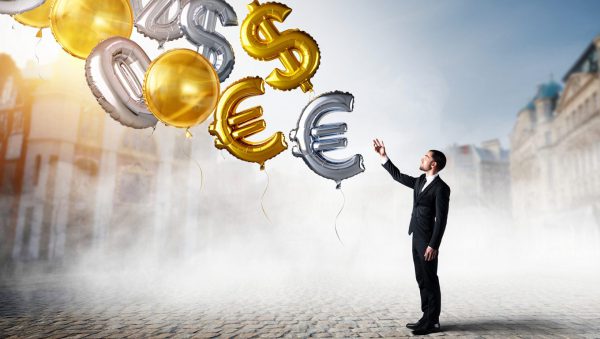
What Causes Inflation to Occur in the First Place? How Mass Psychology Distorts Economic Realities
Apr 1, 2025
When prices surge seemingly overnight, when your grocery bill suddenly jumps by twenty percent, when homes that were once affordable become distant dreams—who or what do you blame? The Federal Reserve? Government spending? Corporate greed? While these factors certainly play their parts, there’s a more insidious force at work—our collective psychology. The terrifying truth is that inflation, perhaps the most pernicious economic phenomenon of our time, is as much a product of mass psychology and herd behaviour as it is of monetary policy or supply chain disruptions. What we believe about inflation helps create the very reality we fear, and few investors or policymakers are willing to confront this uncomfortable truth.
Inflation is not merely an economic event; it’s a psychological cascade that can quickly spiral beyond control. Understanding what causes inflation to occur in the first place requires looking beyond the textbook explanations into the dark corners of human psychology—our fears, our expectations, our tendency to follow the crowd even as it marches toward the precipice. Only by grasping these deeper truths can we hope to protect our wealth and perhaps even profit from the chaos that inflation inevitably creates.
The Traditional Causes of Inflation: Only Half the Story
Economic textbooks will tell you that inflation stems from either too much money chasing too few goods (demand-pull inflation), or from rising costs pushing prices higher (cost-push inflation). There’s demand-pull inflation when the economy overheats and consumer spending outpaces production capacity. There’s cost-push inflation when input costs—energy, raw materials, wages—increase and force businesses to raise prices to maintain profitability. There’s also monetary inflation, caused by the expansion of the money supply that dilutes currency value.
The 2021-2022 inflation surge illustrated all three types simultaneously: Pandemic stimulus flooded markets with money, supply chain disruptions limited available goods, and energy costs soared amid geopolitical tensions. This created a perfect economic storm that pushed inflation to forty-year highs.
But these mechanical explanations miss something crucial: Inflation doesn’t occur in a sterile laboratory of pure economic forces. It happens in the messy, emotional realm of human psychology. What causes inflation to occur in the first place often has as much to do with what we believe will happen as what actually happens in the economy.
When consumers expect prices to rise, they accelerate purchases, creating artificial demand spikes. Workers who expect costs to increase demand higher wages, triggering wage-price spirals. When businesses anticipate higher input costs, they raise prices preemptively. These actions, driven by expectations rather than current economic conditions, can transform inflation fears into inflationary reality—a self-fulfilling prophecy that overrides traditional economic mechanisms.
Inflationary Psychology: The Hidden Accelerant
The most dangerous aspect of inflation is how quickly it can become a self-reinforcing cycle, powered by psychological forces that traditional economic policy struggles to control. When inflation expectations become embedded in the collective psyche, a psychological tsunami begins that can overwhelm rational market functions.
This psychological dimension manifests through several cognitive biases that distort economic decision-making. Recency bias causes people to place excessive weight on recent price increases, projecting them forward indefinitely. Loss aversion—our tendency to fear losses more acutely than we value equivalent gains—makes inflation particularly terrifying, as we watch our purchasing power evaporate. Meanwhile, herding instincts drive collective panic, as individuals mimic the inflation-protection strategies they see others adopting.
Consider what happened in 1970s America. Initial price increases from the oil embargo were aggravated when consumers, fearing further inflation, rushed to buy goods immediately rather than waiting. Businesses, observing this behaviour, raised prices further in anticipation of higher costs. Workers demanded higher wages to compensate for lost purchasing power. These psychological reactions transformed what might have been a temporary price spike into a decade-long inflationary nightmare that required brutal interest rate hikes to finally break.
The media plays a crucial role in amplifying these psychological dynamics. Headlines screaming about “soaring inflation” and “economic crisis” feed fear and accelerate inflation-expectation formation. In today’s digital world, where information—and misinformation—travels instantaneously, inflationary psychology can take hold faster than ever before, overwhelming the traditional economic stabilizers.
When Fear Becomes the Driver: Inflation Cycles and Market Panic
Inflation occurs with such devastating speed because of the transition from rational economic calculation to emotion-driven decision-making. When fear takes control, the normal price mechanisms of markets break down, replaced by panic-driven behaviour that accelerates inflationary forces.
Consider how inflation fears distort investing decisions. As inflation anxieties grow, investors rush toward traditional inflation hedges like gold, commodities, and real estate. This flight to “safety” creates bubble-like conditions in these asset classes, pushing their prices far beyond fundamental values. Meanwhile, bonds and growth stocks—assets particularly vulnerable to inflation—suffer massive selloffs that may exceed rational repricing.
These market reactions can transform temporary inflation into persistent inflation. When businesses see commodity prices soaring, they raise their own prices in anticipation. When consumers see housing costs exploding, they demand higher wages. When investors dump bonds, borrowing costs rise throughout the economy. The initial inflation spark becomes a conflagration, fed by the very actions people take to protect themselves.
As the Stoic philosopher Seneca observed nearly two thousand years ago, “We suffer more often in imagination than in reality.” This wisdom applies perfectly to inflation psychology. The fear of what might happen creates behaviours that bring about the very outcomes we dread. Central banks understand this dynamic, which is why they focus so heavily on managing inflation expectations rather than simply addressing current inflation figures.
The Contrarian Advantage: Profiting When Others Panic
While most investors react to inflation with fear, the disciplined contrarian sees opportunity in the chaos. Understanding what causes inflation to occur—particularly its psychological dimensions—allows astute investors to position themselves advantageously while others flee in panic.
Jesse Livermore, one of history’s greatest traders, noted that “The average man doesn’t wish to be told that it is a bull or bear market. What he desires is to be told specifically which particular stock to buy or sell. He wants to get something for nothing. He does not wish to work.” This observation highlights how most investors seek simple answers during complex times like inflationary periods. They want someone to tell them exactly what to buy—gold, TIPS, commodities—without understanding the deeper forces at work.
The contrarian investor looks beyond these simplistic responses. When inflation fears drive massive rotations out of growth stocks and into commodities, contrarians examine whether the selloff has created value opportunities in quality companies that can actually navigate inflation successfully. When real estate becomes the inflation hedge du jour, pushing prices to unsustainable levels, contrarians look for signs of speculative excess.
Sir John Templeton, another legendary contrarian, advised investing “at the point of maximum pessimism.” During inflation panics, this might mean purchasing high-quality bonds after selloffs have pushed yields to attractive levels or investing in companies with pricing power that can thrive during inflationary periods while others avoid them due to sector-wide fears.
Disciplined Strategies for Navigating Inflationary Markets
Understanding what causes inflation to occur, especially its psychological dimensions, allows investors to develop disciplined strategies that go beyond typical inflation hedges. Here are approaches that harness inflation psychology rather than falling victim to it:
1. Focus on Pricing Power: During inflation, companies that can pass cost increases to customers without losing business thrive. These often include businesses with strong brand loyalty, essential products, or monopolistic market positions. While markets often punish entire sectors indiscriminately during inflation fears, contrarians identify the companies with genuine pricing power.
2. Exploit Volatility with Options Strategies: Inflation fears create market volatility, which inflates option premiums. Selling cash-secured puts on quality companies that have been oversold due to inflation concerns allows investors to generate income while positioning themselves to acquire shares at discounted prices if markets decline further.
3. Consider Real Assets Selectively: While everyone rushes toward real assets during inflation, the disciplined investor evaluates each opportunity critically. Not all “inflation hedges” perform equally. For example, productive farmland has historically provided better inflation protection than gold, with less volatility and more consistent income.
4. Maintain Cash Reserves: While cash loses purchasing power during inflation, maintaining some dry powder allows you to capitalize on irrational selloffs. The market’s inflation-driven panic often creates extraordinary buying opportunities in otherwise excellent businesses.
These strategies require emotional discipline and a willingness to act contrary to prevailing sentiment. As Marcus Aurelius, the Stoic emperor and philosopher, advised: “You have power over your mind—not outside events. Realize this, and you will find strength.” This wisdom is particularly relevant during inflationary periods when emotional reactions typically override rational analysis.
The Future of Inflation: Psychological Dimensions
What causes inflation to occur in tomorrow’s economy may differ from historical patterns. Modern markets face unique psychological influences that could either amplify or mitigate inflationary psychology:
Social media creates unprecedented information cascades, allowing inflation fears to spread faster than ever before. A viral post about empty supermarket shelves can trigger panic buying within hours. Algorithmic trading can amplify market reactions to inflation data, creating flash crashes or melt-ups that feed the public perception of economic instability.
Conversely, increased financial literacy and access to information may help some investors see beyond inflation panic. The democratization of financial knowledge means more people can potentially understand the psychological dimensions of inflation rather than simply reacting to headlines.
Future inflation management will require addressing both economic fundamentals and mass psychology. Central banks increasingly recognize that managing expectations is as important as managing interest rates. The most successful investors will be those who understand both the economic mechanics and psychological dynamics driving inflation.
Conclusion: Mastering the Psychology of Inflation
What causes inflation to occur goes far beyond simple supply and demand imbalances or monetary policy decisions. The psychology of inflation—our collective fears, expectations, and herd behaviours—transforms economic conditions into self-reinforcing cycles that can devastate unprepared portfolios.
By understanding these psychological dimensions, the disciplined investor gains a tremendous advantage. While most market participants react emotionally to inflation fears, those who maintain clarity can identify the distortions created by panic and position themselves to profit when rationality eventually returns.
Remember the wisdom of Epictetus, who taught that “It’s not what happens to you, but how you react to it that matters.” Inflation will occur throughout your investing lifetime—sometimes mild, sometimes severe. Your success will depend not on predicting exact inflation rates, but on mastering your response to the fear-driven market behaviour that inevitably accompanies it.
The investors who thrive during inflationary periods are those who see beyond the headlines, understand the psychological dynamics at work, and have the courage to act with discipline when others surrender to emotion. By cultivating this mindset and applying the strategies outlined above, you can transform inflation from a threat into an opportunity, preserving and growing wealth even as others watch their purchasing power erode.










